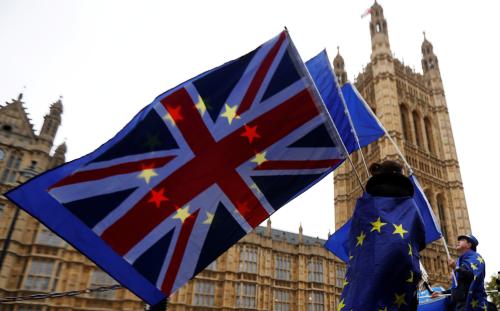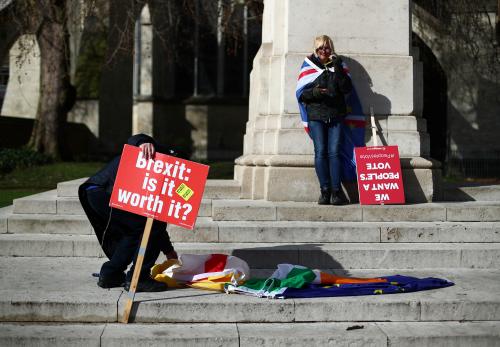Subsequent to the publication of an earlier version of this post, as expected, on Thursday, March 14, the U.K. Parliament voted to seek to delay Brexit by requesting an extension from the European Union. This post has been updated to reflect the actual vote and to include an assessment of the consequences of having done so.
On March 12, the British Parliament overwhelmingly voted down Prime Minister Theresa May’s proposed Brexit deal with the European Union (for a second time). The following day, March 13, Parliament voted to reject the possibility of leaving the EU without a deal, while failing to acknowledge that this is precisely what will happen unless they reconcile themselves to the very deal they rejected the day before.
Yesterday, Parliament voted to extend the Brexit deadline, so as to avoid the need to reconcile these two conflicting positions. The motion for delay includes a short extension request in the event that May’s deal is approved next week in a third vote currently scheduled for Tuesday, or, failing that, to consider a longer extension to allow for various alternative outcomes to the current binary choice before them. But any such extension must be agreed by the EU itself, and European counterparts are fed up and unlikely to easily agree without conditions that could force the U.K. to finally choose between the only options left: the deal they don’t like or the no-deal scenario they (mostly) dread.
It has not been a good week in Westminster.
With the clock ticking, this week’s votes are starting to cut through the government’s political posturing, forcing recognition that there are few options left for the U.K.
Left on the table is either the option the U.K. rejected on Tuesday, or the one they rejected on Wednesday: a “soft Brexit,” including approval of the twice-rejected Withdrawal Agreement negotiated by May, or a “no deal” hard Brexit, which would result in economic and social chaos. Very few actually favor a hard exit, but it remains the legal default position.
While the extension request seems like a logical step, it is fraught with procedural perils. On the one hand, the U.K. can unilaterally withdraw its Brexit notice and reverse the entire process. On the other hand, if delaying the departure process is the U.K.’s objective, the way forward is far more complicated. To do so, under the terms of the EU Treaty, the U.K. will require the unanimous agreement of the other 27 EU members, to be decided at an EU Summit scheduled for March 21-22. While it is in everyone’s interest to avoid a chaotic exit, after well over two years, the EU’s frustration with British internal political dysfunction is at a boiling point. An extension will not be granted without conditions. The U.K. will likely be required to answer fundamental questions around the length and purpose of any such delay.
To consider a wider range of possible next steps—including re-negotiation of Brexit, new British elections, or a second referendum—an extension of at least five months, and probably longer, would be required.
Unfortunately, the elections for the European Parliament (EP) slated for May 23-26 constitute a fundamental impediment constraining the granting of anything longer than a short extension. EP elections are often scoffed at by Brexit supporters. Indeed, “leave” supporters’ disdain for the EP and other EU institutions was a big factor in their pro-Brexit votes. Yet EP elections are a core component of European Union governance. If the U.K. were to receive a Brexit extension beyond these elections, the British would be treaty-bound to hold their own EP elections. Failure to do so would risk undermining the legitimacy, legality, and functioning of core EU institutions, including the EP and the European Commission, and would compromise the basic rights of all EU citizens. This is a step the EU will not be willing to take.
Advocates of a long extension see it as one of the only pathways for the U.K. to remain in the EU. But compromising the legal standing and legitimacy of the EU itself would be too high a price to pay.
Those who argue that the U.K. could quickly hold those EP elections—including, most prominently, European Council President Donald Tusk—fail to appreciate the British political opposition to doing so; a point made evident by the gasps and guffaws that greeted Theresa May when she referred to this possibility in the House of Commons earlier this week. Holding EP elections in the U.K. would be seen as a slap in the face of the majority who voted to leave in the referendum in the first place, and given the already politically poisonous atmosphere currently in the U.K., would inflame an already fractured Britain, exacerbate tensions, and further stoke political enmity.
British participation in those EP elections would also risk highjacking the focus of those elections in other countries away from crucial issues around resisting populism, immigration policy and European integration, and reframing them as a proxy for Brexit-related issues. It would further disrupt already delicate cross-border coalition strategies for European parties that will determine the political composition of the next European Commission and other key EU roles. It would also likely reanimate those forces within the U.K., like those of Nigel Farage, whose anti-EU agitation catalyzed the Brexit movement in the first place.
Even a shorter extension would be no sure thing. Before granting it, the EU will require the U.K. to explain what they will do with the extra time. The EU will not readily grant an extension simply to continue the current stalemate. But it remains unclear what the U.K. could agree to deliver. They would likely need to demonstrate that any extension would be primarily for the purpose of implementing, not for further negotiating. But implementing what?
While in the end the EU might wish to avoid taking the blame for a disruptive no-deal Brexit, if they refuse the extension request next weekend, they will likely play tough on even a short extension. By doing so, the EU would be forcing the U.K. to recognize that they would have little choice but to vote for the very same deal that has now been rejected twice. While May’s deal does not yet command majority support, given the alternative of no deal, it is likely that, in order to avoid a no-deal disaster, it could pass on a cross-party basis, though at the political cost of relying on votes from the opposition Labour Party.
Labour could be willing to provide sufficient support for the deal, but only if it is augmented by commitments to seek an even softer future relationship with the EU, likely based on the European Economic Area (EEA) model. Labour might further insist on a commitment to continued membership in the EU Customs Union, a move that would neuter the Irish backstop issue. This so-called “Norway Plus” option would represent the softest form of Brexit, providing most of the costs but fewer of the benefits than Britain’s current EU membership allows. Norway Plus would be greeted by the EU with a huge sigh of relief, as it would represent one of the least disruptive possible outcomes.
It would, however, devastate those citizens who envision a truly sovereign United Kingdom able to act independently, cut its own trade deals, and be freed from the shackles of Brussels.
A Norway Plus outcome would also represent a potentially irreversible fissure in the Conservative Party. This week’s votes already exposed the total loss of party discipline, disrespect for the party leadership, and disdain for party structures and protocol. British Parliament, seen for centuries as something of a paragon of representative democracy, has become an internationally televised reality show bordering on the farcical.
It will be ironic if the end game results in the softest of Brexits, loss of British stature and standing on the world stage, and the rupturing of the Tory party. It was, after all, David Cameron’s desire to reconcile and unite his party by resolving the internal party clash over the British role in Europe that led to his calling the referendum in the first place. Indeed, what started as a means to keep the Tory party united now seems likely to end with the party torn apart. When May finally resigns, as seems inevitable, the battle for her successor will further expose the deep and irreconcilable split within her party.
In January 2018, I wrote that the options available to the U.K. would ultimately boil down to Norway versus No Deal and that the British Government should spend the year educating the public and demonstrating candor about the limited options Brexit really offered. Theresa May and her government failed to do so. Now, with two weeks remaining, Britain has been exposed as having played a weak hand very badly.





Commentary
Between Brexit and a hard place
March 15, 2019